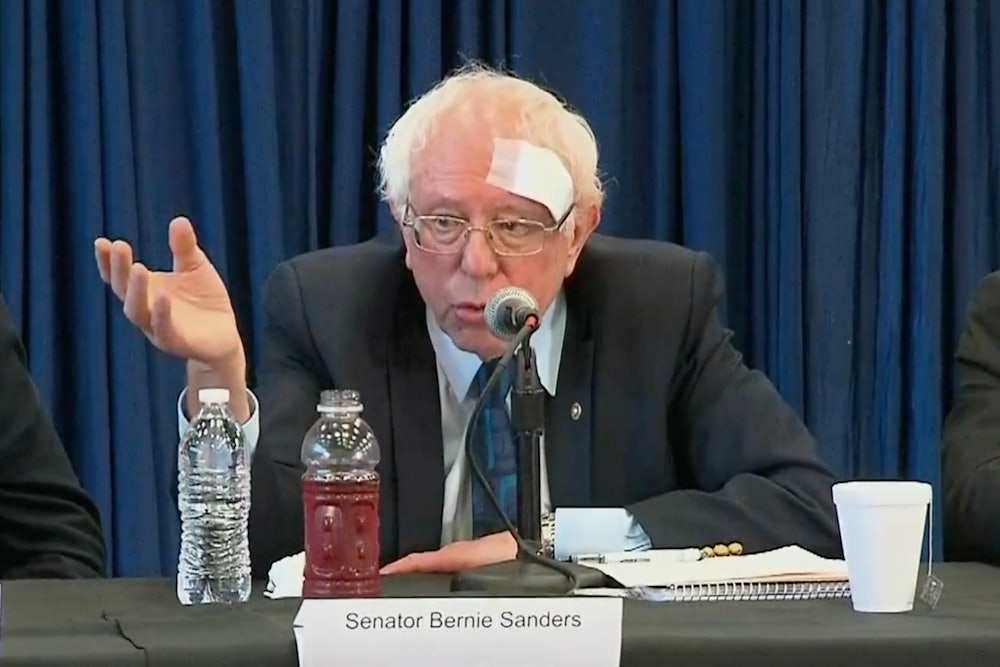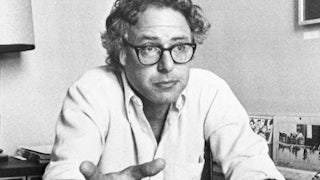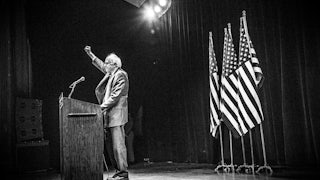At nine o’clock on a Saturday morning in March 2019, on the third week of Bernie Sanders’s 2020 presidential campaign, I found myself on my hands and knees on the floor of a hotel room in Columbia, South Carolina, mopping up a pool of his blood using a pile of towels and a spray bottle of cleaning solution I snagged from a maid’s cart.
Two and a half hours earlier there had been a knock on my door. Terrel Champion, a recent Morehouse graduate who was then Bernie’s body man, was standing outside. It took me a few minutes to get out of bed. Bernie was almost never up that early. He runs late and sleeps late. We often wouldn’t be back in our hotel rooms until midnight, and days rarely started before nine. Before answering the door, I looked down at my phone and saw I had missed about half a dozen calls from Bernie starting at 6 a.m.
“There is an emergency,” Terrel said in his usual even tone. “You need to come to the senator’s room.” Despite Terrel’s demeanor, I knew this was a fairly serious situation.
Entering Bernie’s room at the airport DoubleTree, I found him sitting upright on the edge of his bed in a T-shirt and underwear, with a blood-soaked towel pressed up against his head.
“Let me see it,” I said.
“How bad is it?” Bernie asked as he removed the towel.
I didn’t answer that question, as “bad” would have been an understatement. A slice ran down nearly the entirety of his forehead above his left eye. The skin had split wide open to the point where it looked as though his skull was exposed. As soon as he took the towel off, blood pooled into the cut and ran down his face.
“We need to get you to a hospital,” I said.
“Ari, Ari, Ari,” he replied. When he wanted to make a point, he always said my name three times. Jeff Weaver, his longest-serving and closest aide, would get his name twice. “Terrel” he would only say once. I never could decipher the meaning behind the variance. “Let’s not make any quick decisions. Going to the hospital could be the end of the campaign.”
“Senator, you need stitches.”
“Are you sure?” he replied.
“One hundred percent,” I told him. “Can you stand up?” The cut was not my first worry. That was easy to fix. I was worried about a more significant injury. Bernie got to his feet on his own, demonstrating that his balance was OK.
“Senator, could you please get dressed in your normal pants, a collared shirt, and your sports coat. We are going to get you out of here with nobody noticing.”
I asked Terrel to stay and help Bernie while I went down the hallway and woke up Charla Bailey, one of our campaign’s most experienced advancers, who has spent years working for Bernie producing events large and small all over the country, and who had been responsible for setting up the current trip. Charla loved Bernie, and Bernie both loved and fully trusted her.
/ In honor of Earth Day, TNR’s climate coverage is free to registered users until April 29. Start reading now.
We plotted how to get Bernie out of the hotel incognito. It was approaching 6:45 a.m. Taking an elevator to the main lobby would have meant walking through the hotel’s breakfast area, which was sure to be crowded. The other option was a back exit requiring Bernie to walk down six flights of stairs. That didn’t seem wise, considering the size of the cut on his head. Charla and I decided the lobby was our only option.
Charla would pull a rented minivan around to the front of the hotel while Terrel and I ran Bernie as fast as possible through the lobby. While we prepared to leave the hotel, Charla would figure out the best medical facility for him.
I went back to Bernie’s room. He was now fully dressed, sitting on the bed. I told him we would be walking through a packed lobby. He needed to fold up the towel to fit in his hand, so that it could cover the cut without peeking out. We would not stop in the lobby for any reason. Terrel would take the lead and open the doors. I would glue myself to Bernie’s side, obstructing the diners’ view of him as best I could. When the elevator doors opened on the lobby, we popped out, and, miraculously, we made it to the car without stopping once.
“Is that Bernie?” we heard as we slammed our doors and sped away.
Charla had found an urgent care facility a few miles from the hotel. When we arrived, I told Bernie to wait in the car while I went inside to assess things. Thankfully the waiting room was empty. I spoke to the nurse at the reception desk, explaining that Bernie Sanders had cut open his head and I needed them to triage him to a private room immediately. She looked at me as though I was hosting a hidden camera show but agreed that she would take him in back immediately if it was, in fact, Bernie.
With Bernie inside the examination room, I made my first mistake of the day. I didn’t call Jane. In my defense, Bernie told me not to call her. He said this was not a significant issue and I shouldn’t wake her up and worry her. We would meet her in Las Vegas that night. Stupidly, I listened to him. I would never make that mistake again. When Jane spoke to me later that day, I felt a real sense of shame. She was more than Bernie’s partner. She was the person he trusted most in the world, including on all matters related to his career. She had been his principal political advisor longer than anybody and knew Bernie better than he knew himself. After decades together, they were still deeply in love.
While I didn’t contact Jane, I did call both Jeff Weaver and Faiz Shakir, the campaign manager, to keep them apprised.
In between calls, Bernie asked me to come in the back to the hospital room. He said he would need seven stitches, but otherwise looked fine, remarkably. The doctor told me there was no concussion or any other deeper issue. While we waited for Bernie to be discharged, the urgent care center’s security guard walked up to Charla and me.
“Well, I’m voting for him now,” he said. “If he can walk into here with a cut like that and still be on his feet, he will kick that motherfucker in the White House’s ass.”
Charla and I were relieved, of course, that Bernie was going to be fine. But now we had a new set of problems. His schedule for the day was almost as full as it could possibly be. It was 8:30 a.m. and Bernie was due to have breakfast with a large group of Black pastors in an hour. While they were, and represented, a vital constituency, and while Bernie would be meeting these particular pastors for the first time, I thought there was no chance he could make it now. I called the campaign’s political director, Analilia Mejia, and Chairwoman Nina Turner, who had arranged the event, which was to take place at a Brazilian bakery 30 minutes from the clinic. I explained that something had happened, Bernie couldn’t show, and they would need to handle things. They pushed back. Canceling would be a disaster, they each explained. Bernie struggled to persuade enough people in South Carolina’s African American community in 2016. Now, on his first trip to the state of the 2020 campaign, he would stand up a group of Black pastors? But there was nothing we could do. I conveyed that the reasons for his absence would become evident in a few hours. Annoyed, Analilia said she would make it work.
Five minutes later, Bernie walked out of the facility with a giant bandage on his head. As we got into the car, I told Terrel to drive us back to the hotel, because I had canceled the pastors’ breakfast.
“Why?” Bernie asked. “I’m fine. Let’s go back to the hotel, clean up, and apologize to the pastors for being late.” When I called Analilia to let her know, I could hear the joy and relief in her voice.
Back at the hotel, we had to deal with the mess in his room. The bathroom looked like a scene from the serial killer show Dexter, with blood pooled all over the floor. Bernie had cut himself on the corner of the glass shower door, which opened right in front of the toilet. The blood was not only covering the floor; it had also spread across the glass of the door and all over the sink. We couldn’t leave it that way, imagining photographs of the bloody mess appearing online, connected to Bernie.
Jean-Michel Picher, the campaign’s director of advance, liked to tell potential staff during job interviews that our campaign was different: we were all willing to scrub toilets if that’s what was required. This was literally true. Before the campaign’s first big rally in Los Angeles in March 2019, someone went to the bathroom of the RV we had rented to serve as a hold area for Bernie and his family, and left a mess. So before Bernie’s arrival, we cleaned the toilet.
As Bernie got dressed, Terrel and I were on our hands and knees scrubbing the floors, the glass, and the fixtures. And yes, we cleaned the inside of the toilet. After about ten minutes, we were left with blood-soaked towels. These would have to be disposed of as well.
I scooped the towels up and brought them down to Charla’s room, stopping at the maid’s cart to return the cleaning supplies I had taken. I dumped the towels in Charla’s bathtub and went back to my room to get dressed, while Charla drove the towels away from the hotel and burned them. To this day she will not tell me where she did this.
Having emerged from the urgent care center only about an hour before, I was so tired I could barely stand, after the early wakeup and the stress of the morning. Not Bernie. He was ready to go through his full schedule, even with a comically large white bandage on his head.
On the way to the breakfast with the pastors, I recognized just how good our team was. We worked for a presidential candidate who was seventy-eight years old and at that moment polling ahead of every declared candidate in the race. He had just suffered a major medical incident. This would have been a significant national story, yet there had been no leaks to the press—one of the clearest signs I ever saw of the loyalty Bernie engendered, not just to him, but to the larger cause. Outside the breakfast event, I paced in the parking lot on the phone with Jeff, Faiz, and then communications director Arianna Jones, discussing how to make the injury public and what kind of statement we would release.
Transparency is the basic principle to follow in such moments. In truth, the press is going to find out, anyway. In this case, they would see Bernie with a giant bandage on his head that afternoon and likely a black eye the next day. We would have to explain what had happened. Bernie’s first public event would be a health care town hall before we flew to Nevada. The event was at around noon, and we would need to inform the press before then.
Our other central axiom in this situation was: Show, don’t tell. It would be essential to release the information as close as possible to the health care town hall. Without pictures of Bernie onstage behaving normally, there was sure to be speculation on cable news about his condition.
During a 1991 interview with Judy Woodruff at Harvard’s Kennedy School of Government, the late founder of Fox News, Roger Ailes, offered enduring wisdom about how the media acts: “Let’s face it, there are three things that the media are interested in: pictures, mistakes, and attacks. That’s the one sure way of getting coverage. You try to avoid as many mistakes as you can. You try to give them as many pictures as you can. And if you need coverage, you attack, and you will get coverage.” Ailes summed it up by saying, “It’s my orchestra pit theory of politics. You have two guys on stage, and one guy says, ‘I have a solution to the Middle East problem,’ and the other guy falls in the orchestra pit, who do you think is going to be on the evening news.”
In South Carolina, we had fallen into the orchestra pit. We released a statement shortly before he took the stage—and the incident was nothing more than a blip in the campaign news cycle.
That day, Bernie didn’t miss a single event. He attended the breakfast with Black ministers and the health care town hall, performing well at each. Our flight to Las Vegas was canceled and resulted in a sprint through the airport to make a connection, but we made it to our rally in Henderson, Nevada. While fewer than half a dozen reporters attended our event in South Carolina that afternoon, the press riser in Nevada was packed with cameras.
Bernie, despite his age, has an inhuman amount of energy, an almost maniacal desire to always move forward, and a stubbornness that would not let a quart of blood on the floor of the Charleston Airport DoubleTree disrupt his day.
As for the cut itself: a week later, we were in San Francisco, and a member of National Nurses United met us at his hotel to remove the stitches. There wasn’t even a hint of a scar on his head. “You are fucking Wolverine,” I told him, referring to the Marvel superhero with incredible healing powers. He did not understand the reference.
Excerpted from The Fighting Soul: On the Road With Bernie Sanders by Ari Rabin-Havt. Copyright © 2022 by Ari Rabin-Havt. Used with permission of the publisher, Liveright Publishing Corporation, a division of W.W. Norton & Company, Inc. All rights reserved.








